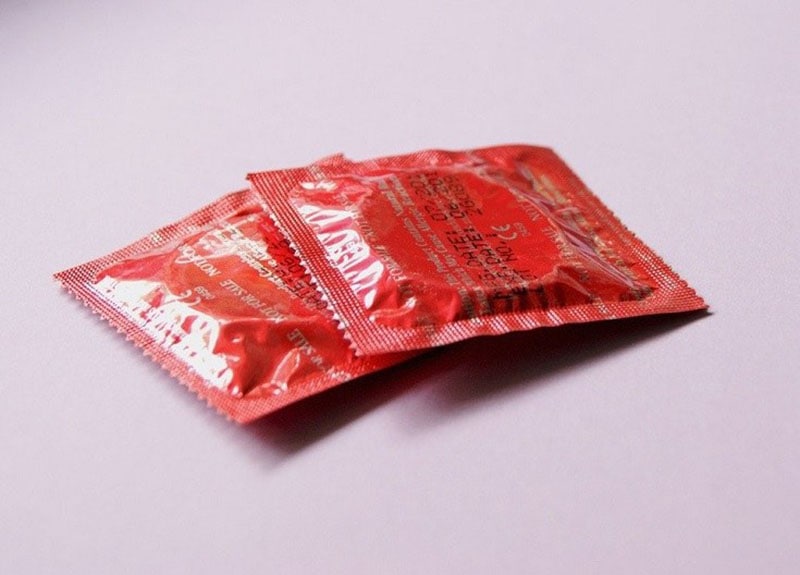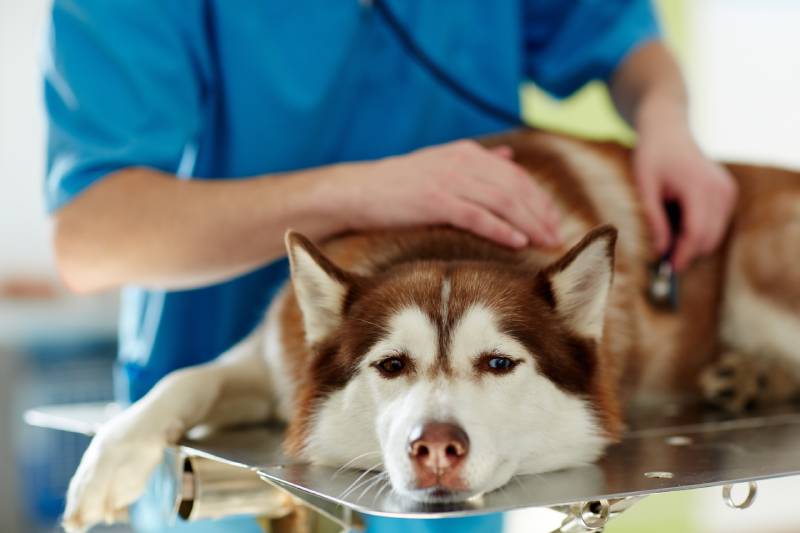Stomach (gastric) ulcers in dogs occur when the protective lining of the stomach, known as the mucosal barrier, becomes damaged. The purpose of the mucosal barrier is to protect the lining of the stomach from its acidic contents.
- Physical components (e.g., mucus)
- Blood supply to the gastrointestinal (GI) tract
- Ability of the cells lining the stomach to be repaired or replaced as needed
- Chemical signals (e.g., prostaglandins) regulating mucus production, blood flow, and cell growth
Anything that increases the amount of stomach acid or changes the mucosal barrier can lead to an ulcer which, once present, will often get worse without treatment. This is because one change often spirals into a cascade of further damage.
 What Causes Stomach Ulcers in Dogs?
What Causes Stomach Ulcers in Dogs?
Stomach ulcers do not just happen spontaneously, particularly in young healthy dogs. One study showed the most common causes of stomach ulcers in dogs to be liver disease and non-steroidal anti-inflammatory drug (NSAID) administration. However, many different factors can contribute to the development of stomach ulcers.
1. Medications
Non-steroidal anti-inflammatory drugs (NSAIDs) are common culprits, including both human products (e.g., aspirin, ibuprofen) and veterinary products (e.g., meloxicam). Corticosteroids (e.g., prednisone, dexamethasone) have also been implicated.
It is important to note that corticosteroids and NSAIDs (or multiple NSAIDs) should never be given together, as this increases the risk of stomach ulcers.
A “washout” period is typically recommended if a patient needs to switch from one type of medication to the other, and stomach protectants may be given proactively.
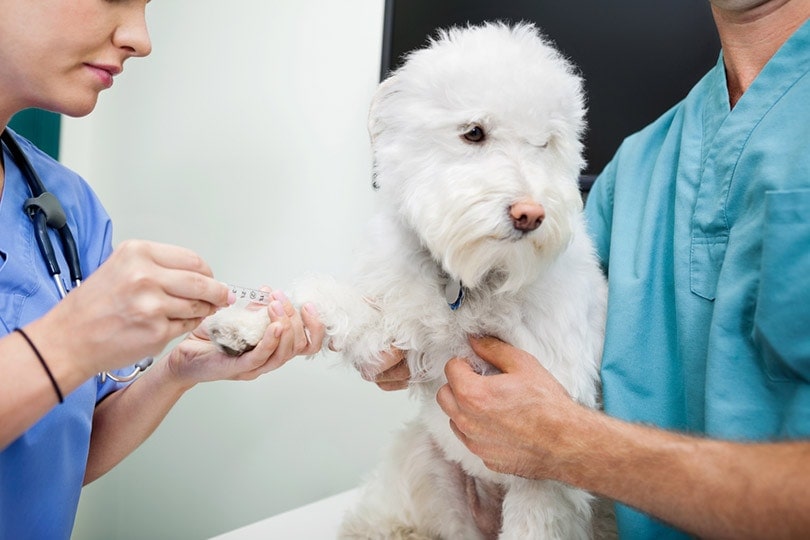
2. Certain Medical Conditions
Stomach ulcers frequently occur in dogs with liver disease and kidney disease. Other conditions such as pancreatitis, irritable bowel syndrome (IBS), and critical systemic illness (e.g., sepsis) have also been associated with stomach ulcers.
3. Reduced Blood Flow to the Stomach
Blood flow to the stomach can be reduced in acute situations like general anesthesia, hypovolemic shock, and gastric dilatation-volvulus (GDV). It may also occur in some chronic diseases, for example hypoadrenocorticism (Addison’s Disease).
4. Dietary Indiscretion
Dogs who eat things they shouldn’t (e.g., physical objects or toxic substances) can directly injure the mucosal barrier.
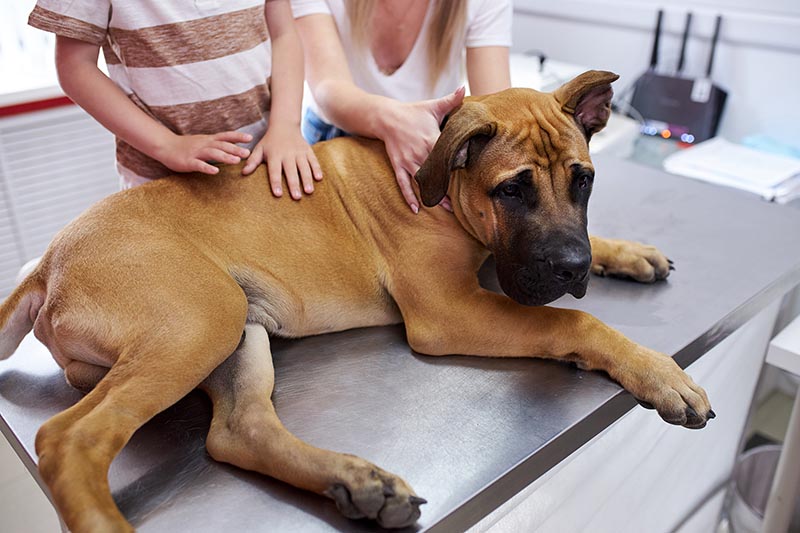
5. Hyperthermia (Heat Stroke)
Stomach ulcers are common in severe cases of heat stroke.
6. Exercise-induced Gastric Disease (EIGD)
EIGD has been noted in high-level canine athletes performing physically demanding activities, particularly endurance racing sled dogs.
7. Neoplasia (Cancer)
- Tumors that directly affect the stomach (not common in dogs, but an example is leiomyosarcoma).
- Paraneoplastic syndrome, where cancer in another part of the body causes changes in the mucosal barrier. A commonly implicated type of cancer is mast cell tumors (MCTs).
8. Spinal Cord Injury
Trauma to the spinal cord, including intervertebral disc disease (IVDD), has been associated with stomach ulcers in dogs.
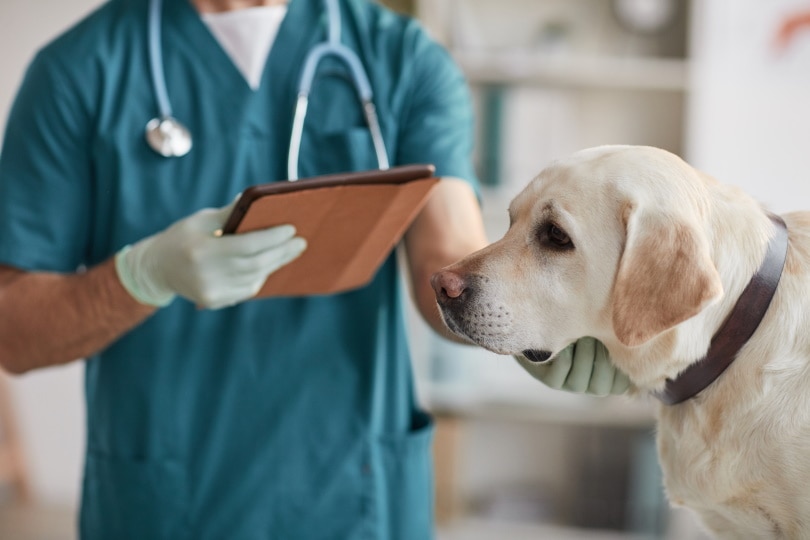
 What are the Signs of Stomach Ulcers in Dogs?
What are the Signs of Stomach Ulcers in Dogs?
Symptoms of stomach ulcers are often not very specific, and some dogs may not show any signs at all.
- Decreased appetite
- Nausea (drooling excessively, turning head away from food)
- Vomiting (vomited material may or may not contain blood, which may look bright red or have a darker brown “coffee grounds” appearance)
- Abdominal tenderness
- Weight loss, if the ulcer(s) have been present for a while
In some cases, an ulcer can progress to a perforation (hole) in the stomach. This warrants urgent veterinary attention!
- Appear weak or collapse suddenly
- Have pale gums and lips
- Show signs of abdominal pain
Unfortunately, dogs with perforated stomach ulcers have a guarded prognosis.
 How Are Stomach Ulcers Diagnosed?
How Are Stomach Ulcers Diagnosed?
Your veterinarian may suspect a stomach ulcer if your dog has one or more predisposing factors and is showing any of the signs listed above. They will perform a thorough physical examination, likely bloodwork, and other diagnostic tests to rule out other causes of stomach upset. If no obvious concerns are revealed, a trial of ulcer medication(s) may be suggested to see if your dog’s symptoms improve.
To definitively diagnose stomach ulcer(s), an endoscopic exam may be recommended. This involves general anesthesia so that a small camera can be passed through the mouth, esophagus, and stomach to look for evidence of bleeding and/or ulceration. If any abnormalities are identified, samples (biopsies) of the affected areas can be taken to determine exactly what’s going on.
In some cases, exploratory surgery may be helpful. The signs associated with stomach ulcers are similar to many other causes of gastrointestinal (GI) upset. While surgery is more invasive than endoscopy, it provides an opportunity to examine the entire GI tract and other abdominal organs. It also allows for biopsies.
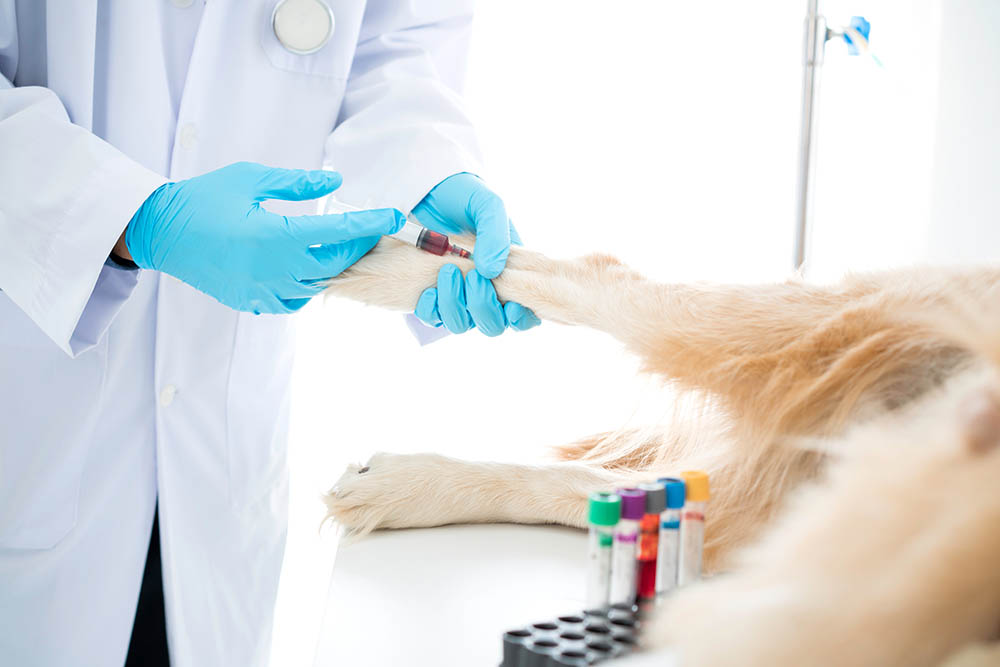
 How Are Stomach Ulcers Treated in Dogs?
How Are Stomach Ulcers Treated in Dogs?
As much as possible, medical conditions that may contribute to the development of stomach ulcers should be managed. Some patients may require a hospital stay for intravenous (IV) fluids and other supportive care.
Briefly, here are the medications commonly used to treat stomach ulcers. They are all human medications, currently used off-label in dogs:
1. Proton-pump Inhibitors (e.g., omeprazole)
This class of medication is extremely good at reducing stomach acid secretion.

2. Histamine-2 Receptor Antagonists (e.g., famotidine)
These also lower the amount of stomach acid produced, but not as effectively as proton-pump inhibitors.
3. Prostaglandin Analogues (e.g., misoprostol)
Misoprostol inhibits stomach acid production and has protective benefits for the cells lining the GI tract. Pregnant people should not take this drug, as it may cause miscarriage.
4. Cytoprotective Agents (e.g., sucralfate)
Sucralfate binds to damaged areas inside the stomach, protecting the cells from further damage. It also increases mucus production. Due to its stomach-coating properties, it can block absorption of other substances. Sucralfate should be given at least 1-2 hours apart from food and other medications.
It is worth noting that patients who have been receiving proton-pump inhibitors or histamine-2 receptor antagonists for longer than a month should be weaned off the medication gradually to avoid the possible rebound effect of increased stomach acid production.
 How Long Do Stomach Ulcers Take to Heal?
How Long Do Stomach Ulcers Take to Heal?
Healing time for stomach ulcers is highly variable. It depends on the severity of the ulcer(s), and whether there are underlying factors (e.g., liver or kidney disease) that will continue to contribute to ulcer development.

Can Stomach Ulcers Be Prevented?
- Do not give your dog any over-the-counter medication (e.g., aspirin) without consulting a veterinarian
- When giving your dog medication, such as an NSAID long-term, use the lowest dose that keeps them comfortable (a multi-modal approach to pain management can help reduce the amount needed)
- Avoid giving corticosteroids and NSAIDs together
- Do not allow your dog to chew on anything that could break into sharp fragments and be swallowed
- Keep house plants, garbage, and other possible toxins safely out of your dog’s reach
- Take care to prevent heat stroke, and consult your veterinarian for advice if your dog regularly participates in strenuous physical activities
- With your veterinarian’s help, manage any medical conditions your dog has that may contribute to the development of stomach ulcers
If you have any concerns about your dog’s potential to develop ulcers, or if you are worried that they may have a stomach ulcer, please contact your veterinarian for help.
See Also:
- Why Would a Dog Poop Blood? 5 Vet Reviewed Reasons & FAQs
- Why Is My Dog’s Stomach Making Loud Noises? 9 Vet Reviewed Causes & Advice
Featured Image Credit: New Africa, Shutterstock

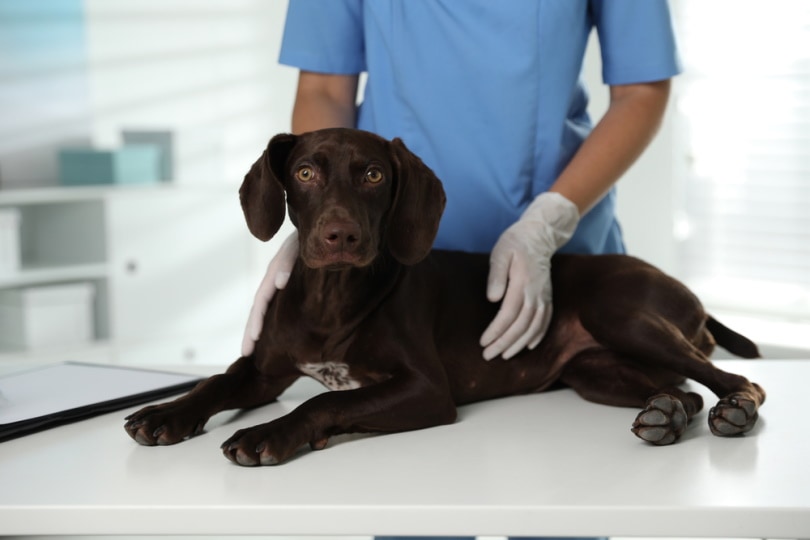
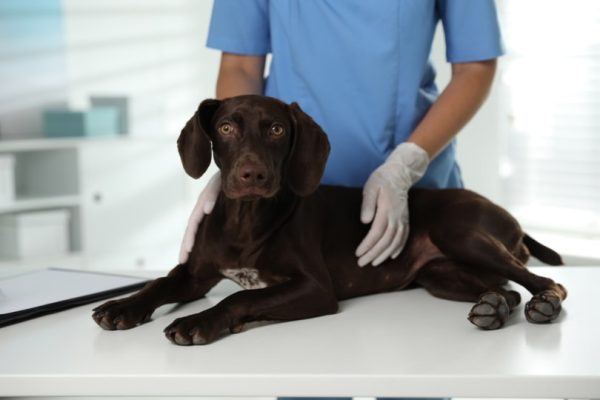
 What Causes Stomach Ulcers in Dogs?
What Causes Stomach Ulcers in Dogs? How Are Stomach Ulcers Diagnosed?
How Are Stomach Ulcers Diagnosed?
